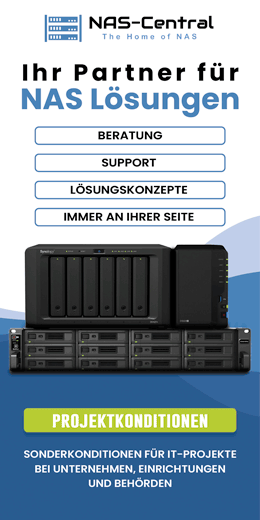Hallo, ich habe jetzt die NAS 1019+ im Einsatz. Wie kann ich denn den SSH Zugang mit Key absichern. Alles Infos aus dem Netz habe ich durch.
authorized_keys angelegt chmod 0600
in der /etc/ssh/sshd_config ist
PubkeyAuthentication yes
AuthorizedKeysFile .ssh/authorized_keys
Es wird aber kein Key genutzt:
Hat jemand noch eine Idee?
authorized_keys angelegt chmod 0600
in der /etc/ssh/sshd_config ist
PubkeyAuthentication yes
AuthorizedKeysFile .ssh/authorized_keys
Es wird aber kein Key genutzt:
Rich (BBCode):
ssh -v admin@192.168.178.100
OpenSSH_8.0p1 Ubuntu-6build1, OpenSSL 1.1.1c 28 May 2019
debug1: Reading configuration data /home/marco/.ssh/config
debug1: Reading configuration data /etc/ssh/ssh_config
debug1: /etc/ssh/ssh_config line 19: Applying options for *
debug1: Connecting to 192.168.178.100 [192.168.178.100] port 22.
debug1: Connection established.
debug1: identity file /home/marco/.ssh/id_rsa type 0
debug1: identity file /home/marco/.ssh/id_rsa-cert type -1
debug1: identity file /home/marco/.ssh/id_dsa type -1
debug1: identity file /home/marco/.ssh/id_dsa-cert type -1
debug1: identity file /home/marco/.ssh/id_ecdsa type -1
debug1: identity file /home/marco/.ssh/id_ecdsa-cert type -1
debug1: identity file /home/marco/.ssh/id_ed25519 type -1
debug1: identity file /home/marco/.ssh/id_ed25519-cert type -1
debug1: identity file /home/marco/.ssh/id_xmss type -1
debug1: identity file /home/marco/.ssh/id_xmss-cert type -1
debug1: Local version string SSH-2.0-OpenSSH_8.0p1 Ubuntu-6build1
debug1: Remote protocol version 2.0, remote software version OpenSSH_7.4
debug1: match: OpenSSH_7.4 pat OpenSSH_7.0*,OpenSSH_7.1*,OpenSSH_7.2*,OpenSSH_7.3*,OpenSSH_7.4*,OpenSSH_7.5*,OpenSSH_7.6*,OpenSSH_7.7* compat 0x04000002
debug1: Authenticating to 192.168.178.100:22 as 'admin'
debug1: SSH2_MSG_KEXINIT sent
debug1: SSH2_MSG_KEXINIT received
debug1: kex: algorithm: curve25519-sha256@libssh.org
debug1: kex: host key algorithm: rsa-sha2-512
debug1: kex: server->client cipher: chacha20-poly1305@openssh.com MAC: <implicit> compression: none
debug1: kex: client->server cipher: chacha20-poly1305@openssh.com MAC: <implicit> compression: none
debug1: expecting SSH2_MSG_KEX_ECDH_REPLY
debug1: Server host key: ssh-rsa SHA256:D50wiMBreh7fxS5rS2sY4+Xn3Qhgls7wtGciItA4VAg
debug1: Host '192.168.178.100' is known and matches the RSA host key.
debug1: Found key in /home/marco/.ssh/known_hosts:201
debug1: rekey out after 134217728 blocks
debug1: SSH2_MSG_NEWKEYS sent
debug1: expecting SSH2_MSG_NEWKEYS
debug1: SSH2_MSG_NEWKEYS received
debug1: rekey in after 134217728 blocks
debug1: Will attempt key: /home/marco/.ssh/id_rsa RSA SHA256:TFmMncMPKkxLP3AC8yFDhjKvhdRTItk4i0XctKIiafI
debug1: Will attempt key: /home/marco/.ssh/id_dsa
debug1: Will attempt key: /home/marco/.ssh/id_ecdsa
debug1: Will attempt key: /home/marco/.ssh/id_ed25519
debug1: Will attempt key: /home/marco/.ssh/id_xmss
debug1: SSH2_MSG_EXT_INFO received
debug1: kex_input_ext_info: server-sig-algs=<ssh-ed25519,ssh-rsa,ssh-dss,ecdsa-sha2-nistp256,ecdsa-sha2-nistp384,ecdsa-sha2-nistp521>
debug1: SSH2_MSG_SERVICE_ACCEPT received
debug1: Authentications that can continue: publickey,password
debug1: Next authentication method: publickey
debug1: Offering public key: /home/marco/.ssh/id_rsa RSA SHA256:TFmMncMPKkxLP3AC8yFDhjKvhdRTItk4i0XctKIiafI
debug1: Authentications that can continue: publickey,password
debug1: Trying private key: /home/marco/.ssh/id_dsa
debug1: Trying private key: /home/marco/.ssh/id_ecdsa
debug1: Trying private key: /home/marco/.ssh/id_ed25519
debug1: Trying private key: /home/marco/.ssh/id_xmss
debug1: Next authentication method: password
admin@192.168.178.100's password:Hat jemand noch eine Idee?








